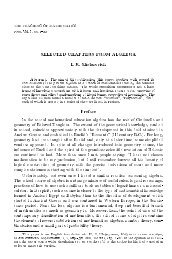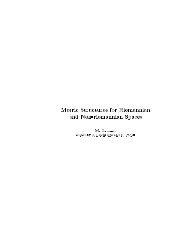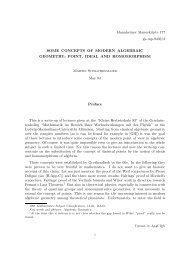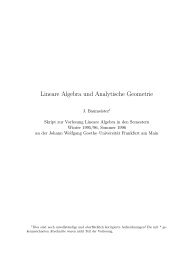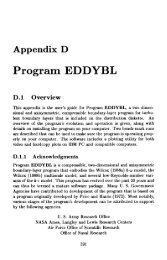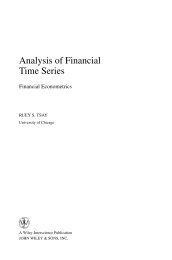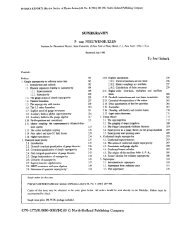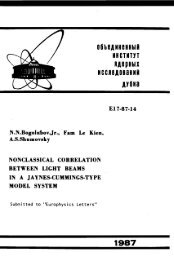Frommer's Las Vegas 2004
Frommer's Las Vegas 2004
Frommer's Las Vegas 2004
Create successful ePaper yourself
Turn your PDF publications into a flip-book with our unique Google optimized e-Paper software.
42<br />
CHAPTER 3 . FOR INTERNATIONAL VISITORS<br />
HEALTH INSURANCE<br />
Although it’s not required of travelers,<br />
health insurance is highly recommended.<br />
Unlike many European<br />
countries, the United States does not<br />
usually offer free or low-cost medical<br />
care to its citizens or visitors. Doctors<br />
and hospitals are expensive, and in<br />
most cases will require advance payment<br />
or proof of coverage before they<br />
render their services. Policies can cover<br />
everything from the loss or theft of<br />
your baggage and trip cancellation to<br />
the guarantee of bail in case you’re<br />
arrested. Good policies will also cover<br />
the costs of an accident, repatriation,<br />
or death. See “Health & Safety” in<br />
chapter 2 for more information. Packages<br />
such as Europ Assistance’s<br />
“Worldwide Healthcare Plan” are<br />
sold by European automobile clubs<br />
and travel agencies at attractive rates.<br />
Worldwide Assistance Services Inc.<br />
(& 800/821-2828; www.worldwide<br />
assistance.com) is the agent for Europ<br />
Assistance in the United States.<br />
Though lack of health insurance<br />
may prevent you from being admitted<br />
to a hospital in nonemergencies, don’t<br />
worry about being left on a street corner<br />
to die: The American way is to fix<br />
you now and bill the living daylights<br />
out of you later.<br />
INSURANCE FOR BRITISH<br />
TRAVELERS Most big travel agents<br />
offer their own insurance and will<br />
probably try to sell you their package<br />
when you book a holiday. Think before<br />
you sign. Britain’s Consumers’ Association<br />
recommends that you insist on<br />
seeing the policy and reading the fine<br />
print before buying travel insurance.<br />
The Association of British Insurers<br />
(& 020/7600-3333; www.abi.org.uk)<br />
gives advice by phone and publishes<br />
Holiday Insurance, a free guide to policy<br />
provisions and prices. You might also<br />
shop around for better deals: Try<br />
Columbus Direct (& 020/7375-<br />
0011; www.columbusdirect.net).<br />
INSURANCE FOR CANADIAN<br />
TRAVELERS Canadians should<br />
check with their provincial health plan<br />
offices or call Health Canada (& 613/<br />
957-2991; www.hc-sc.gc.ca) to find<br />
out the extent of their coverage and<br />
what documentation and receipts they<br />
must take home in case they are treated<br />
in the United States.<br />
MONEY<br />
CURRENCY The U.S. monetary<br />
system is very simple: The most common<br />
bills are the $1 (colloquially, a<br />
“buck”), $5, $10, and $20 denominations.<br />
There are also $2 bills (seldom<br />
encountered), $50 bills, and $100 bills<br />
(the last two are usually not welcome as<br />
payment for small purchases). All the<br />
paper money was recently redesigned,<br />
making the famous faces adorning<br />
them disproportionately large. The<br />
old-style bills are still legal tender.<br />
There are seven denominations of<br />
coins: 1¢ (1 cent, or a penny); 5¢ (5<br />
cents, or a nickel); 10¢ (10 cents, or a<br />
dime); 25¢ (25 cents, or a quarter);<br />
50¢ (50 cents, or a half dollar); the<br />
new gold “Sacagawea” coin worth $1;<br />
and, prized by collectors, the rare,<br />
older silver dollar.<br />
Note: The “foreign-exchange<br />
bureaus” so common in Europe are<br />
rare even at airports in the United<br />
States, and nonexistent outside major<br />
cities. It’s best not to change foreign<br />
money (or traveler’s checks denominated<br />
in a currency other than U.S.<br />
dollars) at a small-town bank, or even<br />
a branch in a big city; in fact, leave any<br />
currency other than U.S. dollars at<br />
home—it may prove a greater nuisance<br />
to you than it’s worth.<br />
TRAVELER’S CHECKS Though<br />
traveler’s checks are widely accepted,<br />
make sure that they’re denominated in<br />
U.S. dollars, as foreign-currency checks<br />
are often difficult to exchange. The<br />
three traveler’s checks that are most<br />
widely recognized—and least likely to



